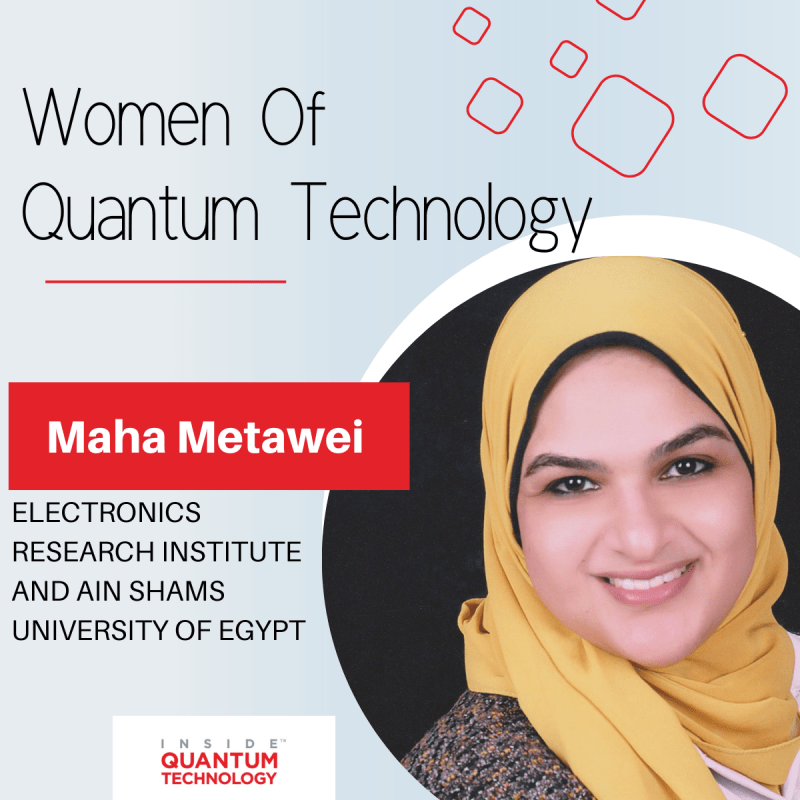Women of Quantum Technology: Maha Metawei of the Electronics Research Institute and Ain Shams University of Egypt

A significant percentage of those participating in the quantum industry are researchers. From graduate students to professors, these individuals help to offer diverse perspectives to the industry while also continuing to advance it. One of these researchers is Maha Metawei, an Associate Researcher at the Electronics Research Institute and a Ph.D. candidate at Ain Shams University, both based in Cairo, Egypt. As she is still completing her studies, Metawei has a unique advantage to watch the industry evolve even before she participates in it. “My research focuses on hybrid quantum-classical machine learning models,” Metawei explained. “My ultimate goal is to make these models more robust and to get better accuracy with each classification experiment I have. I’m also experimenting with different quantum circuits, trying to find the best circuit design for each data set.”
Like many quantum enthusiasts, Metawei became interested in quantum technology only a few years ago. In 2019, her Ph.D. supervisor returned to Egypt from a conference in Spain. Inspired by the conference, he suggested to Metawei to look into quantum computing further. “He handed me the proceedings of the conference and told me: ‘let’s do something in quantum computing. It’s so exciting and it can align with our current interests,’ which was high-performance computing,” Metawei stated. Metawei was immediately interested and began to do her own research. It wasn’t long before she came across the IBM Quantum Qiskit tutorial video series, taught in part by Abraham Asfaw. “He happens to be from Ethiopia,” Metawei said. “This was why he was inspiring to me, because he comes from a developing country, an African country, just like myself. So, I told myself, ‘If he did it and he came from a similar adverse field, then maybe I can do it.’ So, a big thanks to Abraham for helping to deliver quantum education.”
While learning Qiskit, Metawei also gave her first public talk on quantum computing at an international conference in Egypt. “The talk was titled ‘Quantum Computing Revolution.'” she added. “Most of the audience had no idea about quantum computing, so this was an introductory talk. I told the audience that we live in a time where for the first time, we can run quantum algorithms on quantum hardware at a medium scale, which is why we live in a revolution.” After her talk, Metawei also began looking into quantum machine learning. To hone her skills, Metawei began taking other quantum computing courses, specifically the course taught by the nonprofit organization Qubit by Qubit sponsored by IBM Quantum and the University of Oxford. “It went through all the basics of quantum computing,” Metawei said. “It was a very informative session featuring experts in the field. And it was completely free because I had a full scholarship.” With multiple certificates and diplomas in quantum computing, Metawei was excited to continue studying the technology for her Ph.D.
Even though she is not quite finished with her studies in Egypt, Metawei is looking ahead to her next career steps. She hopes to leverage her connections on LinkedIn as well as other places to find the right quantum industry position that suits her. Thanks to a mentorship with OneQuantum, Metawei is confident in her skills. “I’m open to all options,” she stated. “I may participate in more quantum computing challenges too because they’re kind of addictive. They’re so inspiring and they give me opportunities to interact with professionals and peers.” Quantum challenges like those hosted by IBM or other Quantum Platforms providers help to showcase an individual’s coding skills and help them to be seen by potential employers.
Metawei is grateful for these accessible quantum computing challenges and classes, and she sees them as a way to make the industry more inclusive. According to Metawei: “If you can deliver more knowledge to more people, especially like myself who is living in a developing country who don’t have easy access to education, it can really make a difference. Free education plus skill development, like the mentorship programs given by OneQuantum, was a huge boost for my profile as it cost me no money.” Metawei suggests that offering free mentorship specifically is crucial to those wanting to learn quantum computing. “Some great mentor had volunteered his time and effort with me to attend monthly meetings to keep track of my progress and to help fill the gaps in my skillset,” Metawei stated. “I’m so grateful for that. And I think that’s something we have to keep doing to create a more inclusive Quantum Computing workforce.”
Kenna Hughes-Castleberry is a staff writer at Inside Quantum Technology and the Science Communicator at JILA (a partnership between the University of Colorado Boulder and NIST). Her writing beats include deep tech, the metaverse, and quantum technology.



















